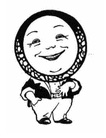
On Russell Kirk, Happy at Home
IN MEMORIAM
Russell Kirk — Catholic convert, father of four, man of letters, occasional contributor to the New Oxford Review, and dean of traditionalist-conservative American intellectuals — died on April 29, 1994, of congestive heart failure at age 75. He lived a life anomalous for its time, and perhaps anomalous as such. He was a man who earned his living by his pen long after this was thought impossible for nonfiction writers, a man born in a Detroit suburb who denounced the automobile as “the mechanical Jacobin” and never possessed a driver’s license, a man of modest means living in a “backward” part of the country who nonetheless expressed his judgments in the confident cadences of an 18th-century Whig magnate.
He was at root a very private man immersed in a public life. But unlike others who in recent memory have been described thus, for Kirk private life was primary, and primarily a display of decency and domestic virtues. The centrality of such domestic virtues for the end of public happiness constituted much of the substance of his political thought. Thus, while his social criticism anticipated contemporary communitarian writings on many points, Kirk understood better than the communitarians what is required for a genuine experience of this elusive thing, “community.” And his rather eccentric life might perhaps best be understood as a lived demonstration of his teaching, Kirk recognized the “need for roots,” and lived in his ancestral village home. He stressed the goods of family life, and he took an active part in raising his four daughters. He championed the virtues of local solidarity, and he was a good neighbor and a justice of the peace.
He wanted to soften or humanize social relations in an age of harsh and grasping disputes generated by rights-talk. Thus, while others worked to extend the realm of rights into the household, Kirk sought on the contrary to leaven public life with the domestic spirit of his own quite cordial household, and he proffered such hospitality as a model for political action. He was a consistent defender of the integrity of the domus against the invading values of the polis and the marketplace. Consequently, he was a defender of the particular against the universal. For what is longed for in our age of progress and alienation is not any abstract “community,” but the concrete and imperfect communities of real neighborhoods and real families.
Furthermore, because modern economies and technologies tend to undermine the functions of small communities, Kirk knew that their defense required a leap of “moral imagination,” a signature phrase taken from Edmund Burke. Before local communities can be defended adequately against the claims to efficiency and rationality of modern political and economic theories, they must be re-valued, and this is a matter of imagination. It was once said deprecatingly that Kirk possessed a great 13th-century mind, but this was a characteristic misjudgment. Rather, his analytical powers were shaped by his encounter with the proto-romantic Burke, while his aesthetic tastes were formed by his love for the romances of Sir Walter Scott, works he continuously re-read throughout his life. True, Kirk emphasized prudence in political life, but more vivid in his writing was an almost child-like sense of wonder at “the unbought grace of life,” and he sought to elicit a like sense of wonder in his readers. Thus, although his “political” views were anti-utopian, they were arcadian: Beneath the surface of all his work lies a vision of the decent possibilities of a once-and-future village life. All regimes must therefore be judged by their tendency to leave and secure us “happy at home.”
You May Also Enjoy
Address to the Donors to the Harvard-Radcliffe Catholic Center, October 30, 1991:
Veritas is…
Reviews of False Dawn: The United Religions Initiative, Globalism, and the Quest for a One-World Religion... The Narnia: The Life and Imagination of C.S. Lewis... Benedict XVI: The Man Who Was Ratzinger...
The title of my article asks if so-called inclusive language is necessary. A typical reply…

